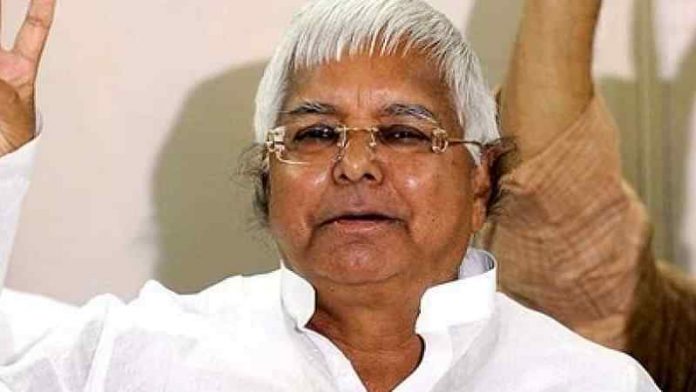
This article has been written by Lipi Garg, pursuing a Certificate Course in Advanced Criminal Litigation & Trial Advocacy from LawSikho.
Introduction
This article intends to analyse the case of the State of Jharkhand v. Lalu Prasad Yadav.
Background of the case
Chaibasa treasury
- In January 1996, Lalu Prasad Yadav was prosecuted and convicted for withdrawing the government funds dishonestly.
- It was found during the investigation that these funds were withdrawn in the name of non-existent companies for the sale and supply of cattle fodder.
- In 1997, he was sent for judicial custody and thereafter the case was transferred to the state of Jharkhand in the year 2000 after the two states (Bihar and Jharkhand) were separated.
- The total amount involved in the Chaibasa treasury was INR 37.70 crores This misappropriation of such a huge amount of money was done through fake vouchers, allotment letters and supply orders.
- The accused had a total of 6 cases registered against him which includes forgery (Section 420 of IPC), Criminal conspiracy (Section 120 B of IPC), and Forgery (Section 13(b) of Preventive Corruption Act).
- Lalu Prasad Yadav resigned as the chief minister of Bihar. After immense pressure from Janata Dal, he formed his own party ‘Rashtriya Janata Dal’.
2013- The first conviction
- A charge sheet was filed by CBI against the accused related to the fodder scam. They were all convicted by the CBI.
- Lalu Prasad Yadav was sentenced to 5 years of imprisonment. He was also barred from contesting elections for the next few years.
- Thus Lalu Prasad Yadav moved to the High Court of Jharkhand to challenge the verdict. The court however upheld the CBI plea to continue the proceedings against him.
 Statement of issues
Statement of issues
- Whether in view of Article 20(2) of the Indian Constitution and Section 300 CrPC, it is a case of prosecution and punishment for the “same offence” more than once?
- Whether there could have been only one trial or more than one involved in various defalcations of different amounts during several years, by different sets of accused persons?
- Whether the trial of cases will be held in the state of Bihar or the state of Jharkhand?
- Whether the applications filed for condonation of delay justified?
Rule
- According to the doctrine of double jeopardy, a person cannot be prosecuted and punished for the same offence twice. The Constitution bars double punishment for one offence. However, it was observed in Maqbool Hussain v. the State of Bombay, that the test of double jeopardy is to ascertain that the two offences committed have the same ingredients
- According to Section 212 read with Section 219 CrPC, there have to be separate trials for different offences occurring in more than one year. It is a settled law that the charges cannot be clubbed here. It was observed in the case of State of Bihar v. Murad Ali Khan that the double punishment is not barred under the
- As a rule, trials are always separate for different charges. However, joint trials are an exception to this rule. A joint trial complicates the matter and also wastes judicial time.
- In the case of Sharupji v. Emperor, it was held that if there is a single trial for separate offences, it would confuse the accused and cause prejudice to them.
- In Ram Lal Narang v. State (Delhi Admn.), there were two cases, where the first case involved offences alleging Section 120-B read with Section 420 and 406 IPC. The second case dealt with offences under Section 120-B read with Section 411 IPC and Section 25 of the Antiquities and Art Treasures Act, 1972. Though the property involved was the same, however since the charges were different therefore there were separate trials for both.
- It was held in Kharkan v. State of U.P even if two offences involving one transaction are committed, they would be dealt with separate charges.
- It was observed in the case of State (NCT of Delhi) v. Sanjay that if the ingredients of the two offences are distinct, the subsequent trial and punishment has no bar.
Judgement
- There were a total of 64 cases registered under the fodder scam. After the reorganisation of the State of Bihar under the Bihar Reorganisation Act, 2000, 52 cases out of 64 were falling within the state of Jharkhand. It was held that the only court that has the jurisdiction to try the offences under the Prevention of Corruption Act is the court of Special Judge and that the place of trial is on the basis of commission of an offence and not on the basis of conspiracy.
- The court opposed the view of Lalu Prasad Yadav stating that it was a single conspiracy and there should be an amalgamation of trials. It was held by the court that the offence of conspiracy is an allied offence and the main charges are under the Prevention of Corruption Act.
- In this case, the court applied the test mentioned in Sardar Sardul Singh Caveeshar v. the State of Maharashtra. It was held that the ingredients of both of the offences are totally different and by no means they form the same meaning. Therefore, Article 20(2) of the Indian Constitution has no relevance.
- The court has also held that since the parties are different, the issue of estoppel would not arise. Each defalcation would amount to an independent offence thus there is no violation of Article 20(2) of the Indian Constitution or Section 300 CrPC in this case.
- It cannot be said that the defalcation is in the same transaction. The transactions are clearly different in different treasuries for different years. They are of different amounts, different allotment letters and even supply orders and suppliers. The provisions of Section 221 thus are not applicable here in this case.
- There was a delay of 113, 157 and 222 days in filing the appeals by CBI. On account of various delays due to departmental and administrative procedures, the application for condonation of delay was filed for filing the special leave petition. It was held in the court that the delay has been sufficiently explained and that the petition cannot be thrown away on the ground of delay.
- It was held that the trial courts must conclude the case within a period of nine months from the date of judgment.
Analysis
Violation of Article 20(2) of Indian Constitution & Section 300 of CrPC
There is no doubt that there was a general conspiracy during the period 1988-1996, however, the defalcations are from different treasuries for different financial years. This amount was far away from the allocated funds to the Animal Husbandry Department every year. The amount involved in each case is different. The fake vouchers, allotment letters and fake supply orders were prepared by different sets of people over a span of a few years. Thus, the offences committed are entirely different from each other. The accused will be punished for these different offences and thus there is no question of violation of Article 20(2) of the Indian Constitution and Section 300 of CrPC.
Joint trial or separate trials
Though the modus operandi is the same, it would not make separate offences into one single offence. In this case, different offences are being committed, thus there has to be an independent trial for each offence. Since the charges involved are covered under the Prevention Corruption Act, therefore it was observed that the main charges were a considerable part of it and the rest of the charges were allied. Separate trials are settled principles of law and joint trials are an exception. Moreover, the joint trials are judicially time-consuming and make the matter complex. The averments and issues get mixed up and it gets very complicated to address the issues. Thus where separate offences are committed involving different issues and people, it is always preferred to go for separate trials.
Condonation of delay
The respondents submitted that the delay of 157 days was not satisfactorily explained by the petitioners. They relied on the case of Postmaster General v. Living Media India Ltd. where it was held that the Law of Limitation binds everybody equally including the Government and that condonation of delay is an exception and should not be used for the benefit of the government department. In the case of Vineet Narain v. Union of India, it was observed that the guidelines with respect to the time frame should be strictly adhered to as CBI Manual has a statutory force.
Though the court was surprised by the delay caused on the part of CBI in such an important matter, it said that it is their duty to not throw away the petition on the basis of the delay caused. It was the responsibility of the Director, CBI to ensure that the appeals were filed within the time frame. Special leave petitions must be filed without any delays.
Conclusion
In May 2017, the Supreme Court held that Lalu Prasad Yadav had to face separate trials as there were different offences involved in the case. The court stated that there is no double jeopardy involved, thus, there is no violation of Article 20(2) of the Indian Constitution and Section 300 of CrPC. The court also held that he has to undergo separate punishments for all the offences committed. The application of condonation of delay was accepted by the court stating the reason that it is their duty to not throw away the petition on the ground of delay. The court, however, held the Director of CBI responsible for the delay caused. It added that people’s faith will be shaken in its effectiveness if delays occur in the filing of such important cases.
Students of Lawsikho courses regularly produce writing assignments and work on practical exercises as a part of their coursework and develop themselves in real-life practical skills.
LawSikho has created a telegram group for exchanging legal knowledge, referrals, and various opportunities. You can click on this link and join:
 Serato DJ Crack 2025Serato DJ PRO Crack
Serato DJ Crack 2025Serato DJ PRO Crack








 Allow notifications
Allow notifications


